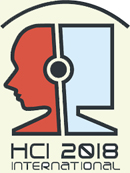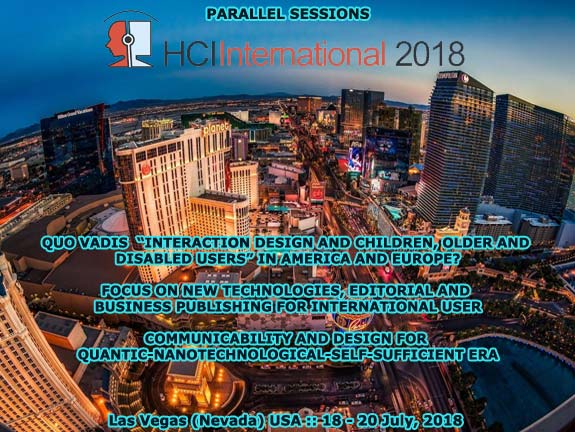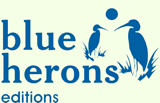Parallel Sessions
Quo Vadis "Interaction Design and Children, Older and Disabled Users" in America and Europe?
Focus on Technologies, Editorial and Business Publishing for International User
Communicability and Design for Quantic-Nanotechnological-Self-Sufficient Era
Being organized in the context of HCI International 2018 :: Las Vegas (Nevada), USA
18 - 20 July 2018
HOME |
|
Introduction, Topics, Program, Deadlines, Program Committee, and Additional Notes 1. Quo Vadis "Interaction Design and Children, Older and Disabled" in America and Europe? Introduction In the parallel section Quo Vadis "Interaction Design and Children, Older and Disabled" in America and Europe? a simple rhetoric question serves us as starting point to orient and reveal a first overview with regard to a set of users of interactive systems who sometimes by some members of the social sciences are regarded as simple goods or customers because of the revenue they generate in R&D pseudo-projects. Both in the EU as well as in America those “pseudo-projects” are often totally financed by the public or private sector. In other words, we are trying to establish the north of the compass, looking at a real crossroads that millions of users must face daily in the view of pseudo scientists who do not have either the theoretical and/or practical knowledge, nor the competence and human skills in the treatment towards that kind of users. Therefore, they present a set of techniques and methods to discover those pseudo scientific investigations, such as the profile of those professionals not capable of such research. Simultaneously, we present works of great originality and creativity which are aimed correctly towards that kind of users, as well as the trends of the research in the short, middle and long term within the present sector of study.
2. Focus on New Technologies, Editorial and Business Publishing for International User Introduction In the parallel session Focus on New Technologies, Editorial and Business Publishing for International User, we reveal the small details about a set of the scientific publications of the 20th and 21st centuries. In the 20th century, the goal of the early pioneers of the multimedia systems was to turn every user into an editor of multimedia contents. Through the current social networks these goals have been accomplished in the multimedia communication among users, when the information is trivial or oriented towards the pastime. However, in the scientific publications, in many occasions the basic rules of the dissemination of the factual and formal sciences are not fulfilled, because of mercantilist and human factors, to mention two examples. Consequently, we analyze the elements that slow down or distort the convergence between design and interactive communication, mainly aimed at the texts, regardless of the digital support used. In this session we will also delve into those domains of the graphic arts in an analogical support which have endured until our days. A set of theoretical and technical knowledge of the masters of the graphic arts which have gone from the digital and interactive support in the last decade of the 20th century. This set of elements of design for communication is the key for the future interfaces of the new interactive devices, whether they are static or mobile.
3. Communicability and Design for Quantic-Nanotechnological-Self-Sufficient Era Introduction In the parallel session Communicability and Design for Quantic-Nanotechnological-Self-Sufficient Era the first foundations for a new Copernican revolution in the context of software and hardware are set in the interrelation of three notions that will make up a triad of bidirectional relationships among: quantum computing, nanotechology, and artificial intelligence. This triad entails new challenges in the context of the training of new communicability and interactive design professionals to face the new models of interfaces for the future small-sized devices belonging to the new technologies of communication and information. In the current parallel session, we intend to generate a first synergy between the different disciplines of scientific knowledge to find high quality solutions with the least possible cost, always trying to diminish the digital divide among the potential users of the new era. An era where the self-sufficiency of intelligent systems, linked to the high calculation speed of processors and to the tiny dimensions of the hardware, some of them even with the possibility of being implanted in the human body, entail new ways of facing the daily life of the local, national and international societies, in a not very distant future. Once again, the quality of the communication is the 'expansion of the communicability', in each one of the design categories, which in our case we have split for the analysis and study in the following way: conection, content, creativity, layout, navigation, panchronic, and structure. Each one of them will play an essential role for the harmonious progress of humankind based on the common good of the citizens of the 21st century. All contributions –papers, demos and posters, should be of high quality, originality, clarity, significance and impact. In the current conference it is demonstrated how with a correct integration among professionals of formal and factual sciences interesting research lines in the following subjects: augmented reality, artificial intelligence, business publishing, communicability, computer science, design, children-older-disabled users, education, human-computer interaction, information and communication technologies, information society, information visualization, interactive systems, local and global user, nanotechnology, quantum computing, research and development, robotics, scientific information, social psychology, social networking, sociology, sciences, etc. Consequently, the discussion will be focused on – but not limited to – the following main issues (alphabetical order): :: Communicability All submitted works will be reviewed by a double-blind (at least three reviewers), non-blind, and participative peer review. These three kinds of review will support the selection process of those that will be accepted for their presentation at the parallel sessions. Authors of accepted works who registered in the conference can have access to the evaluations and possible feedback provided by the reviewers who recommended the acceptance of their contributions, so they can accordingly improve the final version of their works. Best regards, Francisco V. Cipolla Ficarra (Chair - coordinator) AINCI: Asociación Internacional de la Comunicación Interactiva –International Association of Interactive Communication (www.ainci.net), and ALAIPO: Asociación Latina Interacción Persona-Ordenador Latin Association of HCI (www.alaipo.net). Email: info@ainci.com :: info@alaipo.com
2. Program [ July 18 - 20 ] Work in Progress 3. The parallel sessions have the following deadlines: More information: info@ainci.com
4. Program Committee: :: Francisco V. C. Ficarra (chair :: coordinator) Demo Session and Poster Session: :: Miguel C. Ficarra (AInCI and ALAIPO), Annamaria Poli. University of Milano Bicocca (Italy), Andreas Kratky (University of Southern California (USA), Claudio Germak. Polytechnic University of Turin (Italy), José Hamkalo. University of Buenos Aires (Argentina), and Carlos Garcia Garino. National University of Cuyo (Argentina). Scientific Committee: :: Alejandro Frangi. University of Sheffield (UK)
5. Additional Notes PAPER SUBMISSION & PUBLICATION INTERNATIONAL REGISTRATION ACCOMMODATION All this information is here: HCI International 2018
Yours sincerely, Parallel Sessions Secretariat –[1] Quo Vadis “Interaction Design and Children, Older and Disabled Users” in America and Europe?, [2] Focus on New Technologies, Editorial and Business Publishing for International User, and [3] Communicability and Design for Quantic-Nanotechnological-Self-Sufficient Era.
|
|
.

::. FUN .::
Future University Hakodate
Japan
::. IIMROHTAK .::
Indian Institute of Management Rohtak
India
::. HAN .::
HAN University of Applied Sciences
the Netherlands
::. NNU .::
National United University
Taiwan
::. MSU .::
Moscow State University
Russia
::. SORBONNE .::
Paris Sorbonne University
France
::. UBA .::
Universidad de Buenos Aires
Argentina
::. UCL .::
University College London
UK
::. UCR .::
Universidad de Costa Rica
Costa Rica
::. UEF .::
University of Eastern Finland
Finland
::. ULB .::
Free University of Brussels
Belgium
::. UM .::
University of Malta
Malta
::. UNC .::
Universidad Nacional de Córdoba
Argentina
::. UNF .::
Universidad Nacional de Formosa
Argentina
::. UNILJ .::
University of Ljubljana
Slovenia
::. UNLPAM .::
Universidad Nacional de La Pampa
Argentina
::. UofO .::
University of Ottawa
Canada
::. UOI .::
University of Ioannina
Greece
::. USC .::
University of Southern California
USA
::. UWI .::
University of the West Indies
Jamaica
::. VMMI .::
Virtual Maastricht McLuhan Institute
the Netherlands
::. WASEDA .::
Waseda University
Japan
::. WSU .::
Wayne State University
USA
| © 1997 - 2018 ALAIPO & HCI Lab. | ||||
|---|---|---|---|---|







